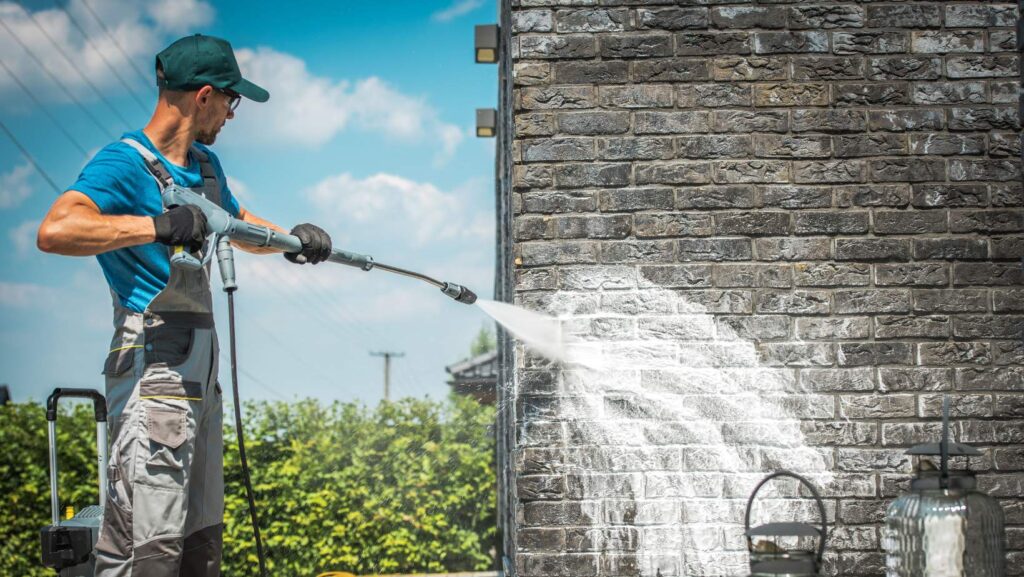Starting a pressure washing business can be a rewarding venture, offering flexibility, profitability, and the opportunity to be your own boss. Whether you are looking for a full-time career or a side hustle, pressure washing is a service in high demand, catering to both residential and commercial clients. However, success in this field requires more than just owning the right equipment.
Understanding licensing requirements, business structures, marketing strategies, and operational management are all critical to building a sustainable business. To start a pressure washing business in 2025, entrepreneurs should focus on obtaining the necessary licenses, investing in high-quality equipment, implementing effective digital marketing strategies, and staying compliant with evolving environmental regulations to ensure long-term success.
This guide provides a detailed roadmap to help you navigate the process of establishing and expanding a pressure washing business.
You Might Like: Best Mileage Tracker App for Accuracy
Understanding the Pressure Washing Industry
The pressure washing industry provides services that range from cleaning driveways and sidewalks to removing grime from buildings and commercial properties. With relatively low startup costs—typically ranging between $1,000 and $10,000—many entrepreneurs find it easy to enter this business. The potential profitability is attractive, with average earnings ranging from $40,000 to $70,000 per year, and profit margins between 10% and 50%.
Factors influencing profitability include:
- Service pricing and competitive market rates
- Effective marketing and client acquisition strategies
- The ability to retain customers and secure long-term contracts
- Operational efficiency in managing costs and maximizing service output
Despite its advantages, challenges such as weather dependency, regulatory compliance, and equipment maintenance must also be considered when starting out.
Essential Licenses and Permits for a Pressure Washing Business
Before launching a pressure washing business, it is crucial to obtain the necessary licenses and permits. Since the business involves handling water mixed with cleaning chemicals, regulatory compliance is mandatory under the Clean Water Act of 1972. This requires proper wastewater disposal plans rather than allowing runoff into storm drains.
Licensing requirements vary by state and locality, but some common permits include:
- A general business or occupational license
- Water discharge or environmental permits to ensure compliance with pollution regulations
- Sales tax registration if offering taxable services
- Home occupation permit if operating the business from home
Checking with local authorities and wastewater management agencies ensures that the business remains compliant with all applicable regulations.
Choosing the Right Business Structure
Selecting the appropriate business structure has long-term implications on liability, taxes, and financial operations. The common structures for a pressure washing business include:
- Sole Proprietorship: A simple structure ideal for single-owner businesses. While easy to set up, it does not provide personal liability protection.
- Limited Liability Company (LLC): Offers liability protection while maintaining tax flexibility, making it a preferred option for small business owners.
- S Corporation: Provides tax advantages over an LLC and is suitable for businesses expecting higher revenue and expansion.
Each structure has pros and cons, so consulting with a legal or tax professional can help determine the best option.
Setting Up Business Finances and Pricing Strategies
Proper financial planning is vital for maintaining profitability. Key considerations include:
- Startup Costs: Initial expenses include purchasing equipment, obtaining licenses, and setting up marketing efforts.
- Ongoing Expenses: Regular costs involve maintenance, fuel, cleaning supplies, insurance, and payroll (if hiring employees).
- Pricing Strategy: Setting competitive rates based on market research, service demand, and operational costs ensures sustainability.
Pricing models may include:
- Hourly Rates: Charging by the hour for services rendered.
- Flat Fees: Offering set prices for common jobs, such as driveway cleaning.
- Package Deals: Providing bundled services at discounted rates to encourage repeat business.
Competitive pricing should balance affordability for customers while ensuring profitability.
Acquiring the Right Equipment
The success of a pressure washing business depends heavily on having high-quality equipment. Essential tools include:
- Pressure Washer: A commercial-grade pressure washer with adjustable PSI settings.
- Nozzles and Spray Tips: Different nozzles allow for varied water pressure applications.
- Cleaning Solutions: Environmentally friendly detergents suitable for different surfaces.
- Water Supply System: A portable water tank for locations without direct access to water.
- Safety Gear: Protective clothing, gloves, goggles, and boots to ensure safety while operating equipment.
New equipment offers reliability but comes with a higher cost, while used equipment can save money but may require frequent maintenance.
Marketing and Branding Strategies
A strong brand identity and effective marketing efforts are crucial for attracting clients. Branding involves selecting a unique business name, designing a logo, and establishing a professional online presence.
Effective marketing strategies include:
- Creating a Website: A user-friendly website with service descriptions, pricing, and contact details enhances visibility.
- Social Media Advertising: Platforms like Facebook, Instagram, and LinkedIn can be leveraged to target local customers.
- Google Business Profile: Optimizing local SEO ensures the business appears in search results when potential customers look for pressure washing services.
- Traditional Advertising: Flyers, business cards, and word-of-mouth referrals still play a role in attracting local clientele.
Networking with local businesses and property managers can also lead to steady commercial contracts.
Hiring Employees and Managing Operations
As the business grows, hiring employees may become necessary to handle increased workload. Key steps in hiring include:
- Obtaining an Employer Identification Number (EIN): Required for payroll processing and tax reporting.
- Setting Up Payroll and Workers’ Compensation Insurance: Ensuring compliance with employment laws.
- Employee Training: Covering equipment handling, safety protocols, and customer service skills.
Additionally, using scheduling software can streamline job assignments, track appointments, and enhance customer relationship management.
Customer Retention and Business Growth
Expanding a pressure washing business involves building strong relationships with customers. Retaining clients can be achieved through:
- Offering Subscription Services: Providing scheduled maintenance contracts for regular cleanings.
- Loyalty Programs and Discounts: Incentivizing repeat customers with special offers.
- Encouraging Customer Reviews: Positive feedback on Google and Yelp increases credibility.
For business growth, diversifying services can attract a wider customer base. Potential expansions include:
- Commercial Pressure Washing: Targeting offices, parking lots, and industrial buildings.
- Fleet Washing: Cleaning vehicles for logistics companies.
- Graffiti Removal: Catering to municipalities and property management companies.
Franchising or opening multiple locations can further scale the business.
Challenges and How to Overcome Them
Starting and running a pressure washing business presents challenges such as:
- Seasonal Demand: Adapting to weather conditions by offering alternative services during slow seasons.
- Competition: Differentiating the business through superior customer service and specialized offerings.
- Regulatory Compliance: Keeping up with environmental regulations to avoid fines and legal issues.
Overcoming these challenges requires strategic planning, continuous learning, and adapting to market trends.
Conclusion
Launching a pressure washing business can be a profitable and fulfilling endeavor, provided that careful planning and execution are prioritized. From obtaining the necessary licenses and investing in the right equipment to developing marketing strategies and expanding service offerings, every step contributes to long-term success. By maintaining strong customer relationships and staying informed about industry trends, entrepreneurs can build a thriving pressure washing business that stands the test of time.




